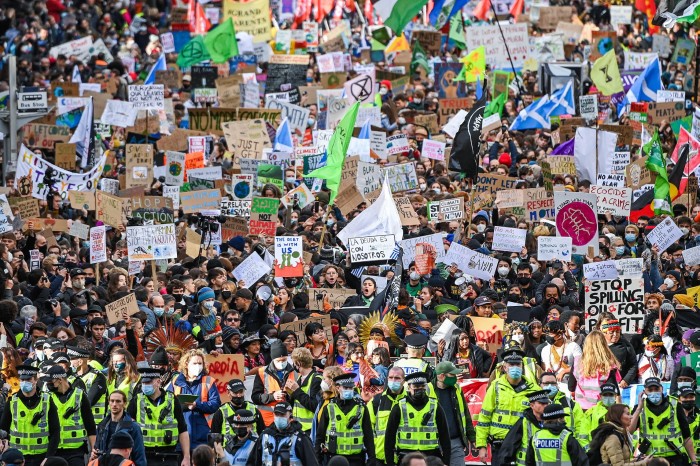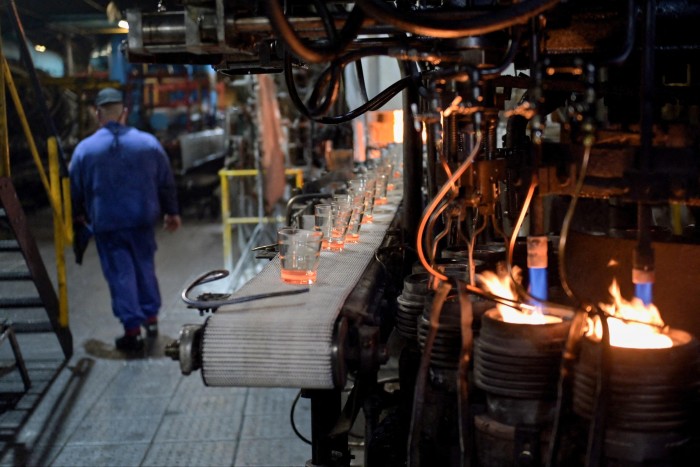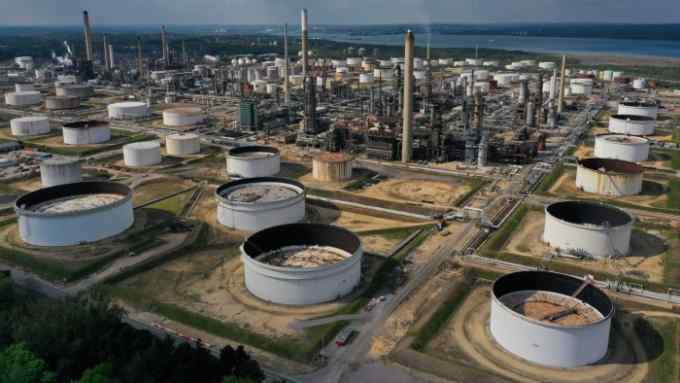Ukraine war and Biden’s IRA force EU to accelerate energy transition

Simply sign up to the Renewable energy myFT Digest -- delivered directly to your inbox.
Nils Aldag says it is schoolchildren he has to thank, in part, for his business now doing well. It has not been an easy ride. Aldag and his co-founder, Christian von Olshausen, started Sunfire, an industrial electrolyser manufacturer, in 2010. But, Aldag says, they were “a bit ahead in terms of our thoughts on how this energy transition would have to happen”.
Trying to get investment into the nascent business in the traditionally conservative German market at the time was like “overcoming the Grand Canyon of death”, the 36-year-old chief executive adds.
However, environmental activist Greta Thunberg’s Fridays for Future movement, which encouraged schoolchildren to skip class on Fridays to campaign on climate action, pushed the energy transition up the agenda for politicians and the public alike. Then came Russia’s invasion of Ukraine. Energy costs in Europe shot up. Businesses began to cut operations and some closed. Policymakers desperately sought alternative fuels and Sunfire’s star began to rise.
The business landscape in the EU is now vastly different — particularly for clean energy companies.
Up and down supply chains, European companies are facing a need to transition at pace from historical dependencies — in particular, reliance on Russian gas, and acceptance of Chinese dominance in clean tech industries, such as solar and wind.
In order to accelerate the move away from Russian fossil fuels and protect EU businesses, the European Commission in May 2022 significantly increased its targets for clean energy capacity in the bloc. That same month, Brussels signed a joint commitment with electrolyser manufacturers to increase electrolyser capacity for hydrogen production tenfold, by 2025.
Sunfire has increased its order numbers by a factor of 10 compared with 2021, Aldag says. “This is really because hydrogen is seen as a way to substitute large amounts of energy that we’re buying now at extremely high costs from countries that we shouldn’t buy this from.”
But companies across the bloc are not only having to find new energy sources but are also forced to operate in a very different geopolitical landscape. Big global economies are putting in place increasingly protectionist measures to shore up industries in the face of inflation and the climate transition. The EU’s response to the US’s announcement that it would plough $369bn-worth of tax credits and subsidies into its clean tech industries — a key part of President Joe Biden’s Inflation Reduction Act — marks a rethink of the bloc’s usually free market attitude.
In March, the European Commission’s Net Zero Industry Act laid out overarching targets for the amount of clean tech production and carbon capture that it wanted the EU to achieve by 2030. Analysts at the influential think-tank Bruegel described the policy proposal as “a return to industrial planning of the 1960s”.

Glass for Europe, a trade association, noted that “the limited support put forward [in the act] is restricted to happy-few net zero technologies.”
And, for more traditional companies, it has been far from a boom time.
Energy-intensive businesses, such as the French glassmaker Duralex and the steelmaker ArcelorMittal, cut production last year to curb costs, while others, including those in key industries such as chemicals production, have pushed up prices.
In a report published in March, industry body BusinessEurope found that, at their peak in 2022, wholesale gas prices were 1,100 per cent higher for EU businesses than in 2019, leaving companies struggling to pay bills. That compares with increases of 200 per cent in the US and 100 per cent in Japan.
Aldag says the cost of electricity to make green hydrogen has also affected heavy energy users wanting to use the fuel further down the value chain. “If you take the overall production costs of hydrogen, you can say that maybe 20 to 40 per cent is related to the cost of the machines you’re using. And something in the range of 60 to 70 per cent is related to the electricity [you need],” he explains. “So, for our off-takers, the production of green hydrogen has become more expensive.”
Fredrik Persson, president of BusinessEurope, the pan-EU business lobby group, says the combination of high energy prices and hefty regulation has made “the risk of deindustrialisation real” unless Europe acts quickly. “If we, Europeans, fail to create an attractive framework today, we will lose urgently needed investments for the green and digital transformation to global competitors such as the US and China,” he says.
In March, the Commission announced reforms to the bloc’s electricity market that it hopes will ease some of the problems — although member states, including Spain and Greece, say they do not go far enough.
With inflation still high, other EU countries and businesses have similarly started to push back against the amount of legislation coming out of Brussels to support the green transition, arguing that industries need a more gradual period of change.
“The EU has established a big milestone: net zero [emissions] by 2050,” says Peter Wilhelm, chair of the shopping centre industry group ECSP. “We would favour a road map providing a more granular approach [to show how to get there].”
The other issue is that there is no quick and easy access to financing
to support the transition. The BusinessEurope report said that foreign direct investment inflows to the EU fell by 66 per cent in 2021 compared with 2019, and EU subsidies for climate-friendly projects are frequently criticised by industry executives as being slow and bureaucratic to access.
Aldag says that it is more than 18 months since Sunfire started an application process for €150mn of funding through the EU’s Important Projects of Common European Interest scheme to scale up its production, and it is yet to receive the money.
Diego Pavía, chief executive of EIT InnoEnergy — an energy transition accelerator funded by the European Institute of Innovation and Technology — says that, despite “a world of pledges and announcements” from industry and policymakers, clean tech sectors such as low carbon hydrogen have been “lacking in action”.
He says industry should not “lean too heavily on a slow morphing of practices” but should embrace ways to “accelerate the energy transition which will ensure energy security.
“This will require innovative thinking and an entrepreneurial spirit like never before.”

Comments